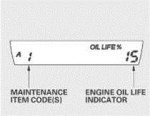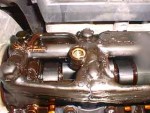We sometimes get questions from our clients about the “Maintenance Minder” system in most newer cars. While it’s true that cars have improved over the last 35 years that we’ve been caring for them, we’ve found that it’s important to service your vehicle on a regular basis. Here’s an excerpt from Greg’s upcoming book that will be published soon.
Q) How often do I really NEED to change my oil? Some places say 3,000 miles and some ads say their oil can go 12,000 miles. What’s the right thing to do?
A) You’ve hit on one of my pet peeves… Short answer is it depends. How often do you need to see your dentist? If you’re planning on keeping your set of pearly-whites for the remainder of your days, then I would say “on a regular basis”, right?
Preventive maintenance is just that…Pre (meaning before) and event-ive (as in something happened)…before something happens.
 We go to the dentist on a regular basis because, while we may not like going, we know that we must go to take care of ourselves; to prevent bad things from happening inside our mouths. It is the same with our cars. Both can be painful and expensive. All you have to do is to wrap your head around the idea that the value of preventing something bad is far greater than the false savings you might try to use to justify your fear of the chair – or the shop.
We go to the dentist on a regular basis because, while we may not like going, we know that we must go to take care of ourselves; to prevent bad things from happening inside our mouths. It is the same with our cars. Both can be painful and expensive. All you have to do is to wrap your head around the idea that the value of preventing something bad is far greater than the false savings you might try to use to justify your fear of the chair – or the shop.
Here’s the secret that most shops don’t pick up on: we are creatures of habit. What was that Greg? What do you mean? Well, once we get used to doing something on a regular basis, we know what to expect, we feel much more in control and our stress levels are much lower.
So… the best way to maintain your car properly is to do it as a planned, scheduled, low-stress way on a regular basis. We have always recommended we see your car three to four times each year.
Most clients at MWI seem to drive between 10 and 15,000 miles per year, some more, some less. We recommend to our clients that we see the car no more than 3750 miles (5000 on some) or by 3 months (4 months on some, but not longer than 6 months), whichever occurs first.
The time elapsing and the maximum mileage generally will help determine the visit frequency. We modify our suggestions for the individual client particular driving habits to maximize their transportation dollar without compromising vehicle life. This is part of the “sensible stewards of your repair dollar” statement within our published corporate mission.
Q) What about the Maintenance Minder – my car says it’ll tell me when servicing is due.
A) While at a training class years ago, I heard a representative from Honda mention the maintenance minder system was going to be integrated into new cars. I knew immediately that this was going to be a big problem; not so much for my business specifically, but for the clients in general. These devices are guessing on a particular schedule based partially on your driving style.
 We’ve personally witnessed the biggest concern I identified way back in that class. If we wait until the car tells us that it needs an oil change, it’s already way overdue.
We’ve personally witnessed the biggest concern I identified way back in that class. If we wait until the car tells us that it needs an oil change, it’s already way overdue.
In one sad case, a client (who drove a company leased Honda Accord) did only servicing according to the maintenance minder. His driving style ended up causing his intervals to be approximately 12,000 miles apart. Guess what…by the time the car gone 48,000 miles, the engine was burning oil excessively. We’ve heard this situation is occurring with more frequency. Recently, Honda Motor Company released a service bulletin that actually suggests that we teach all of our clients how to check and add oil to their engines between service stops because it’s not unusual for them to burn oil due to the longer maintenance intervals. In my mind, this is ridiculous.
Now, if you’re planning on keeping your car for more than 10 years (I hope you are as it’s the best use of your transportation dollar – more on that later) then you would want to prevent major engine problems from occurring at 3 to 4 years into ownership which just so happens to be after the regular warranty from the manufacturer has expired. Remember: prevent the event!
Get into the habit of servicing the car on your schedule, in a proactive way rather than reacting to a guess. The manufacturer stands to gain from you buying a new car and you stand to gain from keeping the one you already paid for in top condition.

